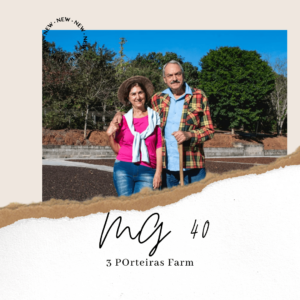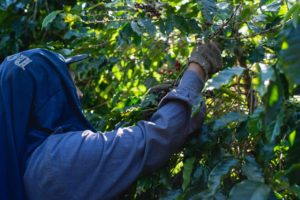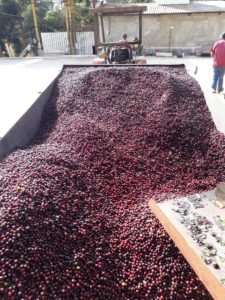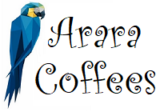
Located in a small village known as INGAÍ, in south state of Minas Gerais, in a region where’s pass the road know as Estrada Real a gold route in colonial times, called “VALE VERDE E QUEDAS D’ÁGUA” (Green Valley and Water Falls).
We arrived here in the end of 1989, unbelievable as it may seem, drive by the desire to live and work on the land.
Pedro an engineer and Maria Helena a doctor, booth without any rural or farming experience, without knowing the region or at least someone that may help them looking for a place.
 The word that comes to the mind is ENCHANTMENT, without a plausible reason to justify beyond the natural beauty of the mountainous and sparsely populated region. Region that in the time we remember, was difficult to access, dirt roads in bad shape, that only received asphalt recently.
The word that comes to the mind is ENCHANTMENT, without a plausible reason to justify beyond the natural beauty of the mountainous and sparsely populated region. Region that in the time we remember, was difficult to access, dirt roads in bad shape, that only received asphalt recently.
Without stopping to reflect, we brought everting and move from a noble big city area to the farm office, which in time was the only available housing.
You can imagine the many falls and mishaps during those years and the attempts to survive from the countryside in different activities such as milk production, beef cattle and finally the coffee, that last on started in 2004.
I consider coffee to be a practically danger choice for “n” reasons: high financial investment in a perennial culture, intense personal involvement, upward learning curve and results, that can be surprising in both ways.
So, we got involved, and little by little, we improved the results in production and quality, studying, establishing contacts with the coffee staff in the various segments, from production, technical consultancy and commercialization.
The coffee establishes bonds between people, bring conversation circles together where the subject is almost always 100% coffee! Pedro with his 72 years and I, Maria Helena at the age of 66, we feel happy and excited with our choice and even with all the mishaps we had we would not go back a single day to review that choice in our life.
So, we both live on the farm as we dreamed one day. In an environment built by us, with trees, many fruits, vegetables and a range of domestic and wild animals, including the birds that roam freely here for our joy.
Our employees also reside on the farm. We have three families that with their children that can have what we consider a healthy life.
“Três Porteiras” dates from the Hereditary Captaincies of Brasil, more than 400 years have passed since the Portuguese Crown hereditary owner exchange it for slaves in the 17 centuries. This was the first registration.
The histories that tell us is the was an inn here where the cowboys rested with the cattle and troops, in they way to the capital, in the time, Rio de Janeiro, on the old road, “Estrada Real”.
The region was productive in dairy and cattle, to supply the capital.
Coffee production came slow, adding milk, cattle and today also grains, tomatoes and other fruits.
We have a temperate climate, typically mountainous, average temperatures of 23 degrees Celsius, well-marked seasons, with the winter being very dry, with the rains concentrated in the summer, which favors coffee growing and harvesting.
Coffee culture
We cultivate coffee in consortium with grasse, brachiaria and surround the crops with banana plantations as natural windbreakers, a little further away from eucalyptus, to reinforce the barrier, considering that it is very windy, which is not good for the coffee plantation.
Cultivation diversification also favors ecological balance, naturally reducing pests and diseases. 
We opted for a traditional cultivation both in nutrition and in the integrated management of pests and diseases, strictly obeying the instructions for environmental, worker and food safety, including the traceability of the Classification Societies of the coffee lots.
We do manual harvesting with women who form a stable group, returning each harvest and also using machinery.
We look for the best fruit ripening point in each plot.
We dry the coffee in the “terreiros” (large football fields areas) and finish in both rotary and static dryers.
The coffee them rests for a minimum period of 30 days to then be benefited.
We are cooperated by MINASUL, a cooperative that supports us for storage, classification of our coffee, sensory tests and placement of production here and abroad.
I am associated with the IWCA- Campo das Vertentes, a Brazilian sub-chapter of the International Platform for Women in Coffee. We are favored by the union of women, as an organization, to exchange information, experiences and even strengthen the marketing of our product.
All of this and more is our life here: work for us is an organizer of life. When we think of the 20 families, who during the harvest live off this work here, from the satisfaction of the group as a united and integrated team, from families that have their material dignity built from the work of their own hands, from our own dignity and from having a cause for which to wake up each morning, we appreciate the much that has been made possible by our choices.
We are pleased to welcome visitors from inside and outside the country here and share some moments of our experience.
Farm: 3 Porteiras 
City: Ingaí Region: South of Minas
Altitude: 1000 to 1045 meters
SCA metodology : 83 pts
Sensorial: Fruit, acidity and sweet balanced, notes with caramel and sugar cane
Coffee Process: Via umida/Seca
Varieties: Catuai 99 e 144 Catucai 2 SL
Volume per year: 1 thousand bags
Country: Brazil
Certifications: Certifica Minas
